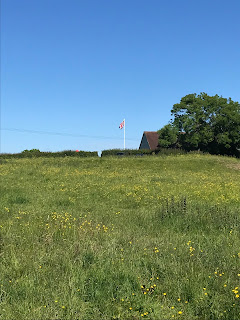This post first appeared in the Radix UK blog,,,
I spent the afternoon of the first jubilee bank holiday on 2 June looking around Virginia Woolf’s old home and garden in the village of Rodmell in Sussex.
It was a beautiful place and a flawlessly lovely day.
After locking ourselves for a little while in the world of Bloomsbury and Keynes, it became clear that from the other side of a hedge towards the down and the sea, marked by a prominent union flag, wafted the unmistakable aroma of sausages cooking.
A few minutes later, we had gone beyond the hedge ourselves to find a number of people apparently dressed in union flags, outside a cricket pavilion. plus musak from a big band, and one older lady who had been at the 1953 coronation.
It was all horribly, deliciously English – the kind of event that Virginia Woolf herself would have written about without really approving of – and we ate our sausages and onions along with the other early-arrivers at the Rodmell village fete.
I enjoy jubilees, I have to say – but I don’t feel entirely comfortable with the old London-centric heritage idea – that somehow national celebrations are just a matter of mixing some beefeaters, some London buses and a flypast by the Battle of Britain flight.
I have no problem with flummery either – on the one condition that we celebrate effective institutions, simply hanging onto the ritual while hollowing out their meaning and purpose is just pointless and horrific.
Some years ago I wrote a book about the English (How to be English) which lists some of the other peculiar elements that make up the sense of being English – from marmite to the last night of the Proms.
I’m aware of course that this won’t include the other nations of GB, but since I believe that our future requires us to be more ambiguously separate, I’ve stuck to pontificating about just the one of them.
But in the case of England, what I found was that many of our most distinctive ‘memes’ actually started elsewhere – from fish & chip (Jewish) and Morris dancing (moorish) to Henry V (Welsh).
I find amazing, and rather wonderful, is that you can actually construct Englishness from these. It may be that the particular at any time is all the English share – and we simply add to our number by a kind of osmosis. After all, it wasn’t that Englishness was created by the climate or weather, which changes from year to year.
If so, then I believe we need to think a little harder than union flags and beefeaters, though I suspect sausages and fried onions might always have something to do with it.



No comments:
Post a Comment